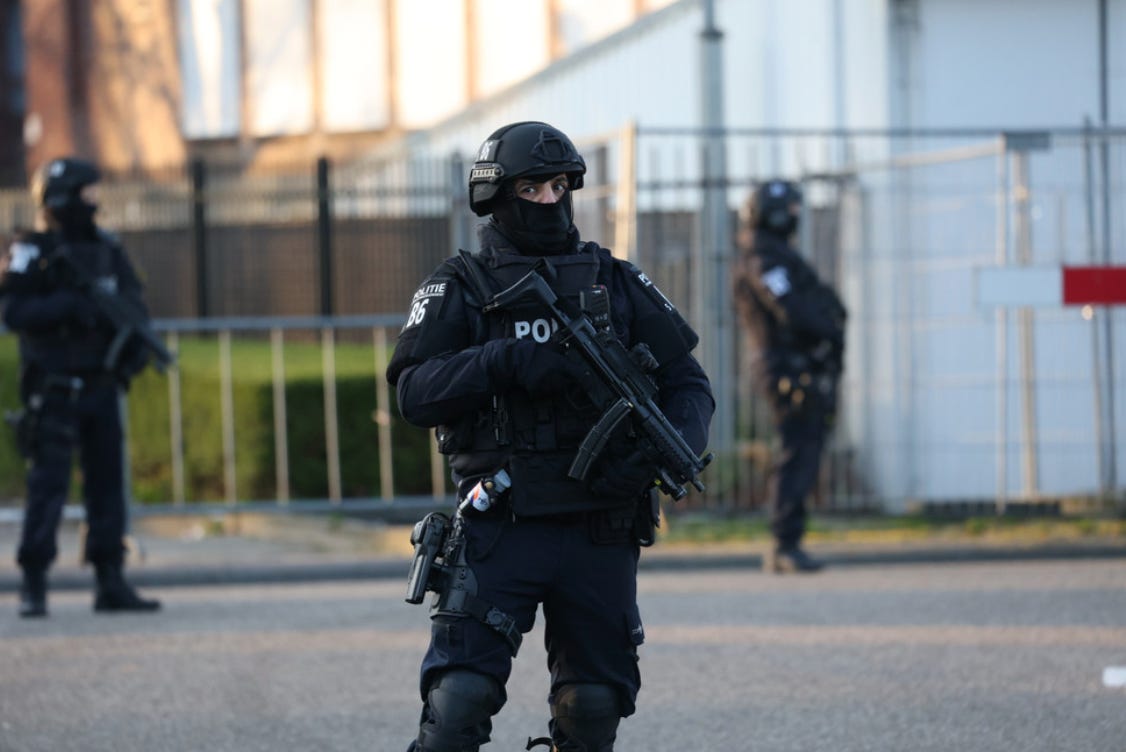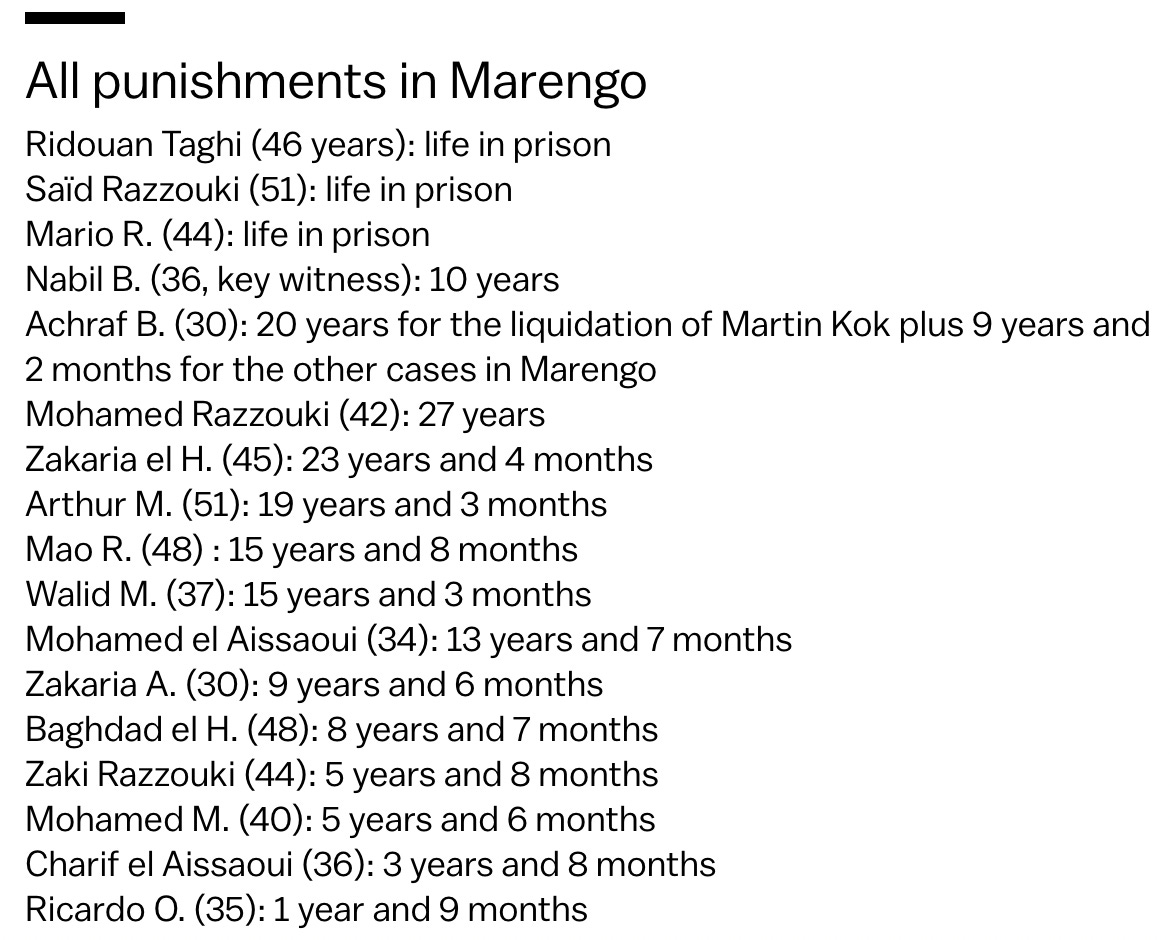Life sentences in a massive Dutch murder trial won't end the violence
The unclear next chapter for organized crime the Netherlands

Last week, seventeen guilty verdicts and three life sentences were demanded in the final outcome of the six year-long Marengo trail, one of the largest criminal trials in Dutch history. The court found that between 2015 and 2017 three leaders of a cocaine trafficking gang had ordered or coordinated six, and other attempted, murders.
In their demand for a life sentence, the court called crime boss Ridouan Taghi “the undisputed leader” of a “murder organization” responsible for “ruthless, disruptive violence” in “a world where a human life is worth nothing.”
The trial is complicated because the trail itself instigated even more violence. Over the years, this violence terrorized society far beyond the criminal underworld and made clear the extent of the power of Dutch drug gangs. However, even though so many people have now been convicted, these verdicts do not represent much of a victory over the Dutch drug trade.
As Wouter Laumans and Paul Vugts wrote in Het Parool:
Tuesday's ruling is just the end of the first half. An appeal will certainly follow. With this knowledge, the very real question arises in both the criminal environment and the security services whether the verdict is the beginning of the end of a trial surrounded by brutal violence, or only the end of the beginning.
The background, as simplified as possible: the Marengo (a random, computer-generated name) murder trial started in 2017. One of these suspects in this initial phase, Nabil B., became a key witness in 2018, agreeing to testify against his former criminal associates.
Nabil B.’s brother was murdered in retaliation just a week later. That summer, publishers who wrote about the case were targeted: the office of the magazine Panorama was shot up and a burning car drove into the office of de Telegraaf.
In 2019, Derk Wiersum, one of Nabil B.’s lawyers, was shot dead in the morning in his quiet Amsterdam suburb. Taghi was arrested in Dubai later that year, but his criminal organization was still very much in operation. In 2021 Peter R. de Vries, confidant to Nabil B, was murdered in the city center of Amsterdam. I wrote about him, his important role in the Netherlands and the significance of his assassination, when life sentences were demanded in his murder trial few weeks ago. In 2022, Crown Princess Amalia and Prime Minister Mark Rutte were put under extra protection due to threats linked to Taghi’s gang.
The severity of these sentences has more to do with the extent of the drug trade in the Netherlands than it does the judiciary necessarily getting a handle on the criminal underworld, as I wrote here.
“Bolle Jos” Leijdekkers, an “extremely wealthy drug baron,” and one of Taghi's key associates, is still at large, presumably hiding in Turkey. Two hundred drug crime-related bombs went off in Rotterdam in 2023. Last week there were four bombings in one night in Amsterdam. More and more cocaine is seized at Rotterdam port every year, but everyone seems to agree that this, too, means that the cocaine trade is booming rather than coming under control.
As John van den Heuvel, who has been under 24/7 protection for his crime reporting for the last six years, wrote in de Telegraaf two weeks ago (before the verdicts were delivered):
Organized crime is rampant, the cocaine machine is still in full swing and new criminal organizations are effortlessly filling in the gaps. If Marengo does indeed lead to convictions next week, a battle has been won, but new parties have long been busy regaining lost ground.
The number of drug trade-related assassinations has been falling in recent years. According to the Trimbos Institute, this could “possibly be explained by the relatively large number of arrests of criminal leaders and other key figures.” It’s not that the threat of criminal prosecution is a deterrent, rather it could also be a matter of “regrouping,” as van den Heuvel writes:
… so that the balance of power in the criminal environment is quietly restored. They wait until the dust from Marengo has cleared and then tirelessly continue with murder and manslaughter. We also saw this wave movement during and after the Passage trial and the Kolbak case against Willem Holleeder.
It’s not clear whether Taghi’s gang—who went far beyond the criminal realm in killing both a lawyer and one of the most famous people in the Netherlands—was particularly violent, or if these murders foreshadow the kind of violence we’re in for in the future. As a strategic advisor at the Dutch Police Union told Trouw: “We have lost our naivety. Previously, criminals mainly concerned themselves with each other, but now they no longer hesitate to threaten the king’s daughter.”
As Rasit Elibol writes in de Groene Amsterdammer:
The question cannot yet be answered. Because yes, there is underworld violence. But that has always been the case. But since the Marengo trial, it is also conceivable that a lawyer is shot dead, and this makes violence against everyone involved in these types of cases conceivable. And that puts everything under pressure. Whether that genie can be put back in the bottle remains to be seen over the next five to ten years.
The Public Prosecution Service is satisfied with the result of the Marengo trial. “Despite everything,” a spokesperson said, “justice has taken its course.”
🔥 Hot Linkjes
Society
Leonardo DiCaprio kissed a Dutch person. (Daily Mail)
A new six-part drama series about Dutch Queen Maxima is coming out on Videoland. It’s the second TV series made about a living royal—they’re trying it make it out to be new Crown. The Dutch royals are losing popularity; Maxima is the most popular of the Dutch royals; royals without popularity equals, like, revolution. Ergo, commence the Maxima myth-making.
International
French President Emmanuel Macron created an uproar saying he wouldn’t rule out sending Western troops to Ukraine. Putin said if NATO does this the west risk nuclear war. Most NATO countries denounced the idea. The NL… not so much. Our top general told Reuters, “you never know what happens in time.”
Politics
Geert Wilders changed his tune on Ukraine aid, saying he was willing to consider it. His previous hardline stance against aid has been a stumbling block to forming a coalition. Separately, the Netherlands signed a 10-year security pact with Ukraine.
A Dutch diplomat resigned over the government’s Gaza policy.
Business
Dutch cargo bike manufacturer Babboe is suspending sales and recalling thousands of models due to safety concerns. Consumer watchdog NVWA said the company failed to follow up on reports of frame breakages. (Guardian)
Arts
The Bonnefanten Museum is exhibiting twenty works from its collection which each tell a “hidden story” about Nazi looting and art sales. Another looted Kandinsky painting, “a pivotal painting in the history of abstract art,” which spent 70 years in the Van Abbemuseum in Eindhoven, was recently returned to its heirs, and sold to an art dealer for $50 million.
Crime
Rapper Bigidagoe was shot dead near Sloterdijk in Amsterdam last Sunday. Bombings went off throughout the week in retaliation to his suspected killers. Police at a Paris airport arrested a 20 year-old suspect in the murder who was attempting to flee to South America.
🥳 Leuke Dingetjes
A Dutch Idol in Los Angeles
After an American Idol audition last week, Lionel Richie said to a Dutch contestant that he wanted “people back in the Netherlands to finally know who you are.” And what am I doing at Dutch Deadline if not following Lionel Richie’s orders? Ziggy, an influencer and TV star, came on 7th place in Dutch Idol when he was fifteen years old.
The Dutch Eurovision entry
Joost Klein released “Europapa,” and it’s already big hit. It was streamed 524,000 times in one day, rare in the Netherlands! It knocked Beyonce down to the second spot in the charts.
A new single from CUT_
I really thought this was Fever Ray when I first heard it. The band is from Amsterdam.
*all typos in this post are on purpose




